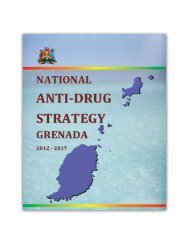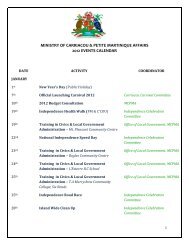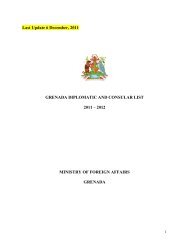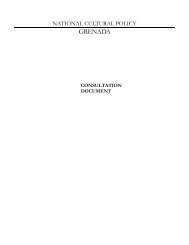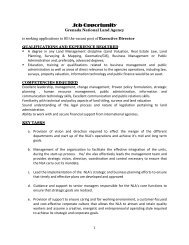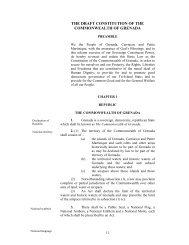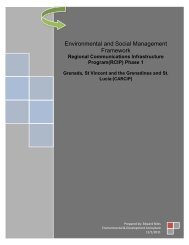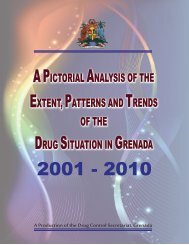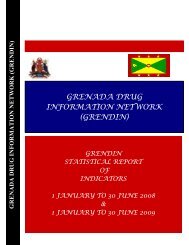Doing Business 2009 - Government of Grenada
Doing Business 2009 - Government of Grenada
Doing Business 2009 - Government of Grenada
You also want an ePaper? Increase the reach of your titles
YUMPU automatically turns print PDFs into web optimized ePapers that Google loves.
Taxes are essential. Without them there would be no money to provide public amenities, infrastructure and services<br />
which are crucial for a properly functioning economy. But particularly for small and medium size companies, they<br />
may opt out and choose to operate in the informal sector. One way to enhance tax compliance is to ease and simplify<br />
the process <strong>of</strong> paying taxes for such businesses.<br />
The <strong>Doing</strong> <strong>Business</strong> tax survey records the effective tax that a small and medium company must pay and the<br />
administrative costs <strong>of</strong> doing so. Imagine a medium-size business, TaxpayerCo, that started operations last year.<br />
<strong>Doing</strong> <strong>Business</strong> asks tax practitioners in 181 economies to review TaxpayerCo’s financial statements and a standard<br />
list <strong>of</strong> transactions that the company completed during the year. Respondents are asked how much in taxes and<br />
mandatory contributions the business must pay and what the process is for doing so.<br />
The business starts from the same financial position in each economy. All the taxes and mandatory contributions paid<br />
during the second year <strong>of</strong> operation are recorded. Taxes and mandatory contributions are measured at all levels <strong>of</strong><br />
government and include corporate income tax, turnover tax, all labor taxes and contributions paid by the company<br />
(including mandatory contributions paid to private pension or insurance funds), property tax, property transfer tax,<br />
dividend tax, capital gains tax, financial transactions tax, vehicle tax, sales tax and other small taxes (such as fuel tax,<br />
stamp duty and local taxes). A range <strong>of</strong> standard deductions and exemptions are also recorded.<br />
Three indicators are constructed:<br />
• Number <strong>of</strong> tax payments, which takes into account the method <strong>of</strong> payment, the frequency <strong>of</strong> payments and the<br />
number <strong>of</strong> agencies involved in our standardized case study.<br />
• Time, which measures the number <strong>of</strong> hours per year necessary to prepare and file tax returns and to pay the<br />
corporate income tax, value added tax, sales tax or goods and service tax and labor taxes and mandatory<br />
contributions.<br />
• Total tax rate, which measures the amount <strong>of</strong> taxes and mandatory contributions payable by the company during the<br />
second year <strong>of</strong> operation. This amount, expressed as a percentage <strong>of</strong> commercial pr<strong>of</strong>it, is the sum <strong>of</strong> all the different<br />
taxes payable after accounting for various deductions and exemptions.<br />
<strong>Business</strong>es care about what they get for their taxes and contributions, such as the quality <strong>of</strong> infrastructure and social<br />
services. Efficient tax systems tend to have less complex tax arrangements, comprising <strong>of</strong> straightforward<br />
compliance procedures and clear laws. Taxpayers in such economies <strong>of</strong>ten get more from their taxes. Simple,<br />
moderate taxes and fast, cheap administration mean less hassle for businesses, and also more revenue collected and<br />
better public services. More burdensome tax regimes create an incentive to evade taxes.<br />
32



